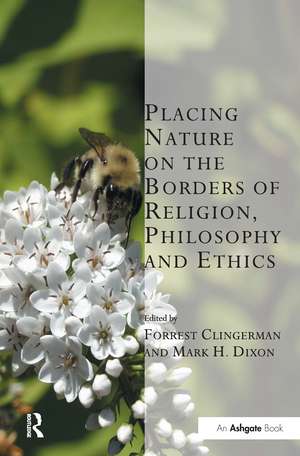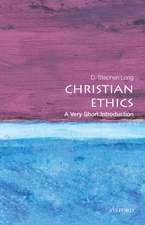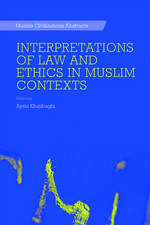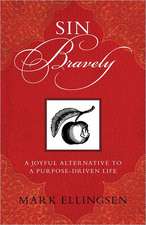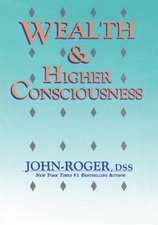Placing Nature on the Borders of Religion, Philosophy and Ethics: Transcending Boundaries in Philosophy and Theology
Editat de Forrest Clingerman, Mark H. Dixonen Limba Engleză Paperback – 13 dec 2021
| Toate formatele și edițiile | Preț | Express |
|---|---|---|
| Paperback (1) | 384.86 lei 43-57 zile | |
| Taylor & Francis – 13 dec 2021 | 384.86 lei 43-57 zile | |
| Hardback (1) | 1059.45 lei 43-57 zile | |
| Taylor & Francis – 19 aug 2011 | 1059.45 lei 43-57 zile |
Din seria Transcending Boundaries in Philosophy and Theology
-
 Preț: 411.81 lei
Preț: 411.81 lei -
 Preț: 411.64 lei
Preț: 411.64 lei -
 Preț: 414.32 lei
Preț: 414.32 lei -
 Preț: 386.39 lei
Preț: 386.39 lei -
 Preț: 462.81 lei
Preț: 462.81 lei -
 Preț: 385.47 lei
Preț: 385.47 lei -
 Preț: 469.34 lei
Preț: 469.34 lei -
 Preț: 469.34 lei
Preț: 469.34 lei -
 Preț: 382.36 lei
Preț: 382.36 lei -
 Preț: 415.24 lei
Preț: 415.24 lei -
 Preț: 389.38 lei
Preț: 389.38 lei - 17%
 Preț: 258.14 lei
Preț: 258.14 lei -
 Preț: 436.14 lei
Preț: 436.14 lei -
 Preț: 409.51 lei
Preț: 409.51 lei - 13%
 Preț: 309.63 lei
Preț: 309.63 lei -
 Preț: 389.66 lei
Preț: 389.66 lei -
 Preț: 363.00 lei
Preț: 363.00 lei - 18%
 Preț: 844.81 lei
Preț: 844.81 lei -
 Preț: 442.07 lei
Preț: 442.07 lei -
 Preț: 382.75 lei
Preț: 382.75 lei
Preț: 384.86 lei
Nou
Puncte Express: 577
Preț estimativ în valută:
73.64€ • 77.08$ • 61.29£
73.64€ • 77.08$ • 61.29£
Carte tipărită la comandă
Livrare economică 31 martie-14 aprilie
Preluare comenzi: 021 569.72.76
Specificații
ISBN-13: 9781032243283
ISBN-10: 1032243287
Pagini: 238
Dimensiuni: 156 x 234 x 13 mm
Greutate: 0.34 kg
Ediția:1
Editura: Taylor & Francis
Colecția Routledge
Seria Transcending Boundaries in Philosophy and Theology
Locul publicării:Oxford, United Kingdom
ISBN-10: 1032243287
Pagini: 238
Dimensiuni: 156 x 234 x 13 mm
Greutate: 0.34 kg
Ediția:1
Editura: Taylor & Francis
Colecția Routledge
Seria Transcending Boundaries in Philosophy and Theology
Locul publicării:Oxford, United Kingdom
Notă biografică
Forrest Clingerman is Associate Professor of Philosophy and Religion at Ohio Northern University. He has published a number of essays and journal articles on environmental theology and hermeneutics. He has also held leadership positions in the AAR Religion and Animals Consultation, the International Society for the Study of Religion, Nature and Culture, and the European Forum for the Study of Religion and the Environment.
Mark H. Dixon is an Associate Professor of Philosophy. His primary research interests are in environmental philosophy and environmental ethics. He has published articles in environmental ethics and in the philosophy of architecture.
Mark H. Dixon is an Associate Professor of Philosophy. His primary research interests are in environmental philosophy and environmental ethics. He has published articles in environmental ethics and in the philosophy of architecture.
Cuprins
Chapter 1 On the Spiritual Understanding of Nature, Páll Skúlason; Part 1 Restoring Place and Meaning, Mark H. Dixon; Chapter 2 Restoration in Space and Place, William R. Jordan III; Chapter 3 Shame, Ritual and Beauty, Todd LeVasseur; Chapter 4 Recreating, in] Eden, Daniel T. Spencer; Chapter 5 Re-creation, Mélanie Walton; Chapter 6 Eschatology of Environmental Bliss in Romans 8:18–22 and the Imperative of Present Environmental Sustainability from a Nigerian Perspective, Sampson M. Nwaomah; Chapter 7 Resurrecting Spirit, James Janowski; Chapter 8 Chanting the Birds Home, A. James Wohlpart; Part 2 Recreating Place, Reconnecting with Others, Forrest Clingerman; Chapter 9 Reading Ourselves through the Land, Martin Drenthen; Chapter 10 Who am I, who are these People, and what is this Place? A Hermeneutic Account of the Self, Others, and Environments, David Utsler; Chapter 11 Concern for Creation, David C. McDuffie; Chapter 12 Recreate, Relate, Decenter, Anna L. Peterson; Chapter 13 Replacing Animal Rights and Liberation Theories, Jonathan Parker; Chapter 14 Re-Placing the Doctrine of the Trinity, Sarah Morice-Brubaker; Chapter 15 In the Beginning and in the End, H. Peter Steeves;
Recenzii
"Rediscovering place at the convergence of philosophy and theology, the authors in this timely collection gift the reader with fresh insights into dwelling responsibly on the earth. Placing Nature on the Borders weaves case studies and hermeneutical investigations into a richly interdisciplinary inquiry into the values that bind our identities to our embodied inhabitation. Addressing the ethics of restoration in natural and built places, our obligations to wild and domestic animals, and the spiritual dimensions of our everyday environments, these essays demonstrate the mutual dependency between where we are and who we are, challenging us to acknowledge the meanings and obligations that emerge at that convergence—and to relocate our humanity in a broader vision of our shared world."—Ted Toadvine, University of Oregon, USA
"The essays in this volume are thoughtful and critical. They are also diverse—both in style, and in the approach and content that the various authors bring in as being relevant to the examination of place... In short, Placing Nature on the Borders of Religion, Philosophy and Ethics is a rich, well-organized volume that should be read by anyone interested in the topic of place in environmental thought."—Environmental Philosophy
"[This book] ticks all the right boxes. It brings together subjects which are diminished if considered in isolation. Furthermore, the Editors share with Scruton and ecologists generally the importance of place... The volume] deal[s] with important topics."—Science & Christian Belief
"The essays in this volume are thoughtful and critical. They are also diverse—both in style, and in the approach and content that the various authors bring in as being relevant to the examination of place... In short, Placing Nature on the Borders of Religion, Philosophy and Ethics is a rich, well-organized volume that should be read by anyone interested in the topic of place in environmental thought."—Environmental Philosophy
"[This book] ticks all the right boxes. It brings together subjects which are diminished if considered in isolation. Furthermore, the Editors share with Scruton and ecologists generally the importance of place... The volume] deal[s] with important topics."—Science & Christian Belief
Descriere
Placing Nature furthers the dialogue on religion, ethics, and the environment by exploring three interrelated concepts: to recreate, to replace and to restore. This book self-consciously reflects on the intersections of environmental philosophy, environmental theology, and religion and ecology, stressing the importance of how place interprets us an
